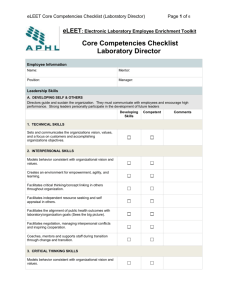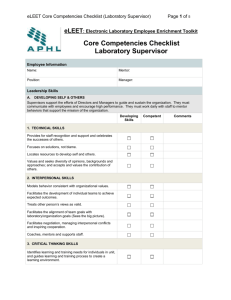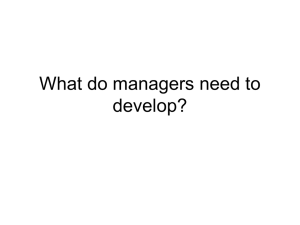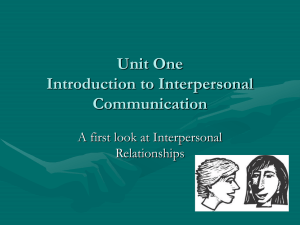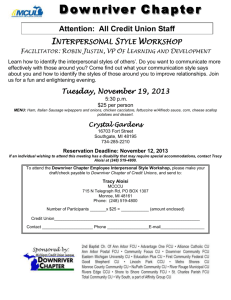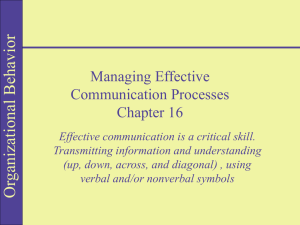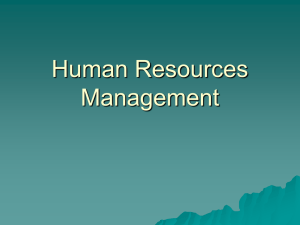Core Competencies
advertisement
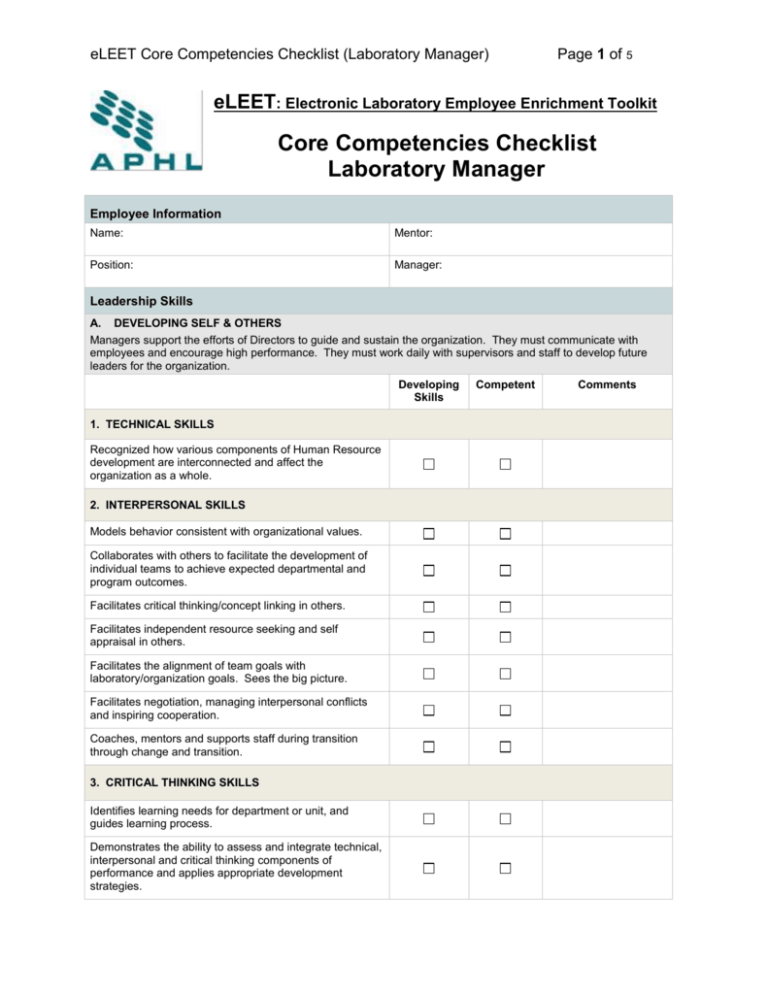
eLEET Core Competencies Checklist (Laboratory Manager) Page 1 of 5 eLEET: Electronic Laboratory Employee Enrichment Toolkit Core Competencies Checklist Laboratory Manager Employee Information Name: Mentor: Position: Manager: Leadership Skills A. DEVELOPING SELF & OTHERS Managers support the efforts of Directors to guide and sustain the organization. They must communicate with employees and encourage high performance. They must work daily with supervisors and staff to develop future leaders for the organization. Developing Skills 1. TECHNICAL SKILLS Recognized how various components of Human Resource development are interconnected and affect the organization as a whole. 2. INTERPERSONAL SKILLS Models behavior consistent with organizational values. Collaborates with others to facilitate the development of individual teams to achieve expected departmental and program outcomes. Facilitates critical thinking/concept linking in others. Facilitates independent resource seeking and self appraisal in others. Facilitates the alignment of team goals with laboratory/organization goals. Sees the big picture. Facilitates negotiation, managing interpersonal conflicts and inspiring cooperation. Coaches, mentors and supports staff during transition through change and transition. 3. CRITICAL THINKING SKILLS Identifies learning needs for department or unit, and guides learning process. Demonstrates the ability to assess and integrate technical, interpersonal and critical thinking components of performance and applies appropriate development strategies. Competent Comments eLEET Core Competencies Checklist (Laboratory Manager) Page 2 of 5 Incorporates customer needs and expectations into decision-making. Operational Competencies B. OPERATIONAL THINKING/PLANNING Contributes to strategic plan development. Works with supervisors and staff to execute the strategic plan. Developing Skills Competent Comments 1. TECHNICAL SKILLS Recognizes how various components of strategic planning are interconnected and affect the organization and its operations as a whole. Integrates strategic thinking/planning into day-to-day operations/decisions and long term planning such as preparedness. 2. INTERPERSONAL SKILLS Identifies and communicates the individual and team’s role in achieving desired outcomes. Assures that project/plan is supported by reinforcing project goals and objectives. Promotes motivation. Contributes ideas that shape strategic direction of the institution in a consistent basis. Collaborates with others to meet department, program and organizational needs and goals. 3. CRITICAL THINKING SKILLS Plans and implements projects, programs, and activities in a multi-disciplinary, team-based environment involving appropriate human, financial and material resources. Analyzes the nature of a problem and clearly describes desired outcomes. Conceptualizes problems and investigates solutions. Assesses the interrelated steps within a plan to anticipate changes in time lines. Demonstrates ability to complete all steps of a strategic/business plan for a patient population or a hospital service (Assures assessment such as SWOT analysis, plan development, implementation, reassessment, and evaluation). Analyzes and makes adjustments to project plans as necessary. C. MANAGING RESOURCES The day to day operations must support the strategic plan and minimize costs. Good stewardship of resources requires financial and operational planning as well as continuity of operations in case of an emergency. eLEET Core Competencies Checklist (Laboratory Manager) Developing Skills Competent Page 3 of 5 Comments 1. TECHNICAL SKILLS Gathers data and uses technology to convert data into meaningful information. Accesses organizational and community resources to facilitate performance which produces desired organizational outcomes. 2. INTERPERSONAL SKILLS Demonstrates effective communication skills conducive to collaborative management of resources. Develops consensus and is an enabler to collaboration. Listens to all stakeholders and treats their opinions as valid. Establishes an environment which supports effective resource management. Teaches and coaches others the technical, interpersonal and critical thinking skills to manage resources at the advanced beginner level. 3. CRITICAL THINKING SKILLS Analyzes and utilizes appropriate data to make effective decisions and to monitor or forecast outcomes. Uses and communicates re computer/analytical models. Considers impact of decision options and implementation on others before reaching a conclusion. Predicts perception and grieving responses. Aligns appropriate financial, human, and material resources to accomplish organizational goals and objectives. Proactively plans support for teams based on their resource needs. D. INFORMATION MANAGEMENT Senior leadership must be an effective spokesman for the organization and within the organization. Developing Skills 1. TECHNICAL SKILLS Designs data collection tools Advocates for laboratory with outside organizations. Creates fact sheets and other tools to respond to inquiries Keeps staff informed of issues and latest technical advances Competent Comments eLEET Core Competencies Checklist (Laboratory Manager) Page 4 of 5 Establishes an environment for effective data management. Focuses on data from a department or program. 2. INTERPERSONAL SKILLS Mentors staff to maintain a customer focus. Teaches others about available data and sources. 3. CRITICAL THINKING SKILLS Analyzes data using basic statistics. Utilizes data to plan, monitor and evaluate. Assists others to adapt guidelines. E. IMPLEMENTATION OF QUALITY IMPROVEMENT/QUALITY ASSESSMENT Leadership must analyze the performance of the organization and make strategic decisions for improvements to achieve high performance. Developing Skills 1. TECHNICAL SKILLS Demonstrates understanding of the significance of data. Serves as a resource and facilitates staff involvement in monitoring and follow-up. Oversees multi-disciplinary quality improvement projects within the department. Converts data and information for use in planning, using techniques such as fish-bone analysis, development of plans and tracking techniques. 2. INTERPERSONAL SKILLS Provides opportunities to increase the knowledge of staff relative to the QI/PI process. Provides an environment conducive to the QI/PI process. 3. CRITICAL THINKING SKILLS Rethinks processes and structure to improve quality while reducing costs. Develops solutions based on data and expected results. Analyzes emerging trends. Serves as a resource and facilitates staff in problemsolving and plan development. Integrates all components of QA/QI program including Competent Comments eLEET Core Competencies Checklist (Laboratory Manager) Page 5 of 5 value added analysis into laboratory’s decision making process and PI processes. F. PROCESS MANAGEMENT Leaders must design processes to meet key requirements of the organization including incorporation of new technology and organizational knowledge. Developing Skills Competent 1. TECHNICAL SKILLS Oversees compliance with ethical, legal or regulatory requirements. Provides structure and environment for practice of professional and support staff groups including dealing with unions. 2. INTERPERSONAL SKILLS Seeks out staff concerns. Communicates underlying principles and rationale to broaden staff perspective and understanding. Mentors and develops advanced beginner and competent leaders (supervisors and managers). Promotes the integration of the unique perspectives of a professionally, culturally, racially and gender diverse staff. Establishes plans to overcome negativity. 3. CRITICAL THINKING SKILLS Assists staff to establish priorities and develop negotiation skills. Maintains unbiased approach to problem solving. Looks at whole picture when problem solving. Oversees Human Resource management processes. Employee Signature: Date: Trainer/Mentor Signature: Date: Supervisor Signature: Date: Comments
